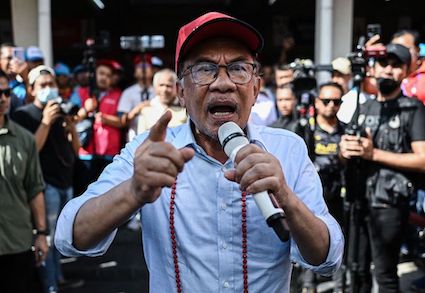Taking the Measure of Anwar Ibrahim

Malaysia’s new premier’s personality traits could sabotage his administration
Murray Hunter
With Malaysia’s Anwar Ibrahim just completing his first 90 days in office as prime minister, his government appears to be riding high, with Anwar scoring a 68 percent popularity rating in a recent Merdeka Centre poll. But broken down, that is an ominous figure. Of that 68 percent, only 15 percent of respondents were very satisfied, 53 percent were somewhat satisfied, and 19 percent were either somewhat or very dissatisfied with him.
In the same poll, the Pakatan Harapan administration received an approval rating of only 54 percent, indicating the “unity government” coalition enjoyed only a very short honeymoon period, or didn’t have one at all, as the survey was taken from mid-December to mid-January.
In considerable measure, the problem is the 75-year-old Anwar himself. On the hustings, he has built a reputation as one of the great speakers of Malaysian politics. He has a deeply loyal following. With his becoming Malaysia’s 10th prime minister after his two-decade plus campaign through considerable adversity, expectations are very high. Some see him as a savior who will solve the nation’s considerable problems, probably best described as the Obama effect.
But there is a belief the prime minister’s rhetoric has not matched his performance, generating a deep sense that he won’t make any bold moves during his tenure. There is widespread disappointment with his cabinet, and with his administration’s decision-making machinery. His recent budget attests to that, although to his credit he has ordered the cancellation and retendering of RM22 billion of suspect projects, and ordered the cashiering of featherbedding GLC officials.
Among the business community, there is a feeling that hard decisions are not being made, with the government instead opting for lightweight measures like the much-criticized plan to make sanitary napkins available free to poor women. Too often, according to longtime Malay businessmen, ministers are perceived as arrogant and mistrustful of business. There is no attempt on Anwar’s part to rein them in, an indication that while he may be a galvanic speaker capable of inspiring the troops, he has long been criticized for his inattention to administration and detail, a near-fatal flaw in the Pakatan Harapan government that fell earlier.
As example of his unwillingness to take tough decisions, he doesn’t see administration from the view of a technocrat. He sees pragmatism as a means to remain popular, and thus maintain his power. He favors fuel subsidies and won’t reestablish the goods and services tax, both of which are costing the economy in the form of badly needed revenues. He has so far allowed the Home Ministry to retain the draconian SOSMA Act, which still allows for detention without charges.
Despite a commitment to democratizing a multiracial society, policies to attain that pledge are not based upon any set vision, but upon what will maintain his power as leader. The Merdeka poll found a massive 71 percent of Malays are dissatisfied with Anwar’s government.
Since becoming prime minister, Anwar has gone out of his way to meet with regional leaders, and those of the Islamic world, generating concerns that he is on the road too much rather than paying attention to his country’s voluminous problems. His public phone call with Turkish prime minister Recap Tayyip Erdogan on the rostrum during his first press conference as prime minister comes to memory. In smaller private gatherings, he has been known to compare himself with Nelson Mandela, Nik Aziz, and even Ho Chi Minh. His first walk-about in his own electorate of Tambun shows the awkward reality.
His relationships over the years indicate difficulty in holding down trusted friendships. He has often publicly fallen out with some of his closest confidents. He surrounded himself with some of his long co-activists, such as Tian Chua, Sivarasa A/I Raiah, and FarharshWafa Salvador. At one time he was close to businessman John Soh Chee Wen, who has belatedly been jailed for the Singapore penny stock crash of 2013, and more recently to another businessman Koo Tee Yam. Many of his old comrades today have lost either access to him, or no longer have any influence.
The appointment of his daughter for a short time as his economic adviser indicates that Nurul Izzah has a lot of influence over her father’s thinking. Today, Anwar is kept in a closely-knit cocoon of advisers.
The cabinet was no doubt selected on the basis of loyalty and trustworthiness to his cause. For example, the current minister of health Zaliha Mustafa was most probably selected because she served his wife Wan Azizah Wan Ismail as political secretary for a long period of time and can be totally trusted.
Some insecurity and history of personal betrayals have greatly enhanced Anwar’s deep sense of Machiavellian instincts. He tends to see the end game as most important, and has little empathy towards others in achieving this. This is perhaps one reason close friends become mortal enemies over time. Many are lauding the Malaysian Anti-Corruption Commission (MACC) for going wholeheartedly after corrupt politicians. But from another perspective, the arrests could be regarded as an all-out attack on those he sees as political enemies.
Anwar has often promised more than he can deliver, which is damaging to his credibility. After the 2008 general election, he announced that with the support of Sabah MPs, he would have the numbers to take over the government. This fizzled when the Badawi administration sent many of these MPs to Taiwan and Korea on a “study tour.”

